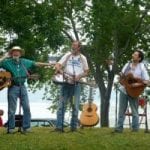Mike and Peggy Seeger’s New CD – Fly Down Little Bird
It is hard to imagine any two children growing up in America being more thoroughly exposed to traditional American music than Mike and Peggy Seeger. Their parents, Charles and Ruth Crawford Seeger, were deeply involved in folk music and worked closely with John and Alan Lomax, beginning in the 1930’s, to help transcribe and publish the folk songs that were being collected around the time of the Great Depression.
Mike Seeger devoted his life to discovering, preserving, promoting, playing, and singing old time country music. He eventually settled in rural Rockbridge Country, Virginia – near Lexington, with a view of the Blue Ridge Mountains across the valley to the east. As a young woman, Peggy Seeger moved to England and has spent most of her life there involved in politics, songwriting, making music, and raising a family.
In 2008 Mike and Peggy got together for a project to record some of their favorite childhood songs, arranging and recording them in a style similar to the way they learned to sing them at home with their parents. Most of the recording was done in Mike’s home, a setting that allowed them to capture the simple beauty of their voices and acoustic instruments. Mike passed away in August 2009 but Peggy and Alexia Smith, Mike’s widow, completed the project and have produced a wonderful album of traditional songs entitled Fly Down Little Bird.
These are the last recordings that Mike made and he and Peggy have left us with a rare memento of Mike’s life and devotion to traditional music. Almost every type of folk song imaginable is represented on Fly Down Little Bird: songs of love, jealousy, broken hearts, political and social injustice, memories of home, dreams of heaven – and one lively fiddle tune.
The fourteen tracks on Fly Down Little Bird include some familiar songs such as “Cindy”, “The Farmer is the Man”, “Jennie Jenkins”, “My Home’s Across the Blue Ridge Mountains”, and “Little Birdie” – all beautifully sung as you would expect from siblings who first sang the songs together as young children some seventy years ago.
Other songs are less familiar and are truly a pleasure to discover. Two of my new favorites are “Blood Stained Banders” and “Big Bee Suck the Pumpkin Stem”. I was surprised to learn, after a little on-line research, that “Blood Stained Banders” is an early Nineteenth Century spiritual. Ruth Crawford Seeger transcribed the song for American Folk Songs for Christmas as “Don’t You Hear the Lambs A-Crying”. It has been recorded by a number of artists under a variety of titles, including “Good Shepherd” on the Jefferson Airplane’s 1969 album Volunteers.
“Big Bee Suck the Pumpkin Stem” is an interesting title that initially called to mind Mike’s way of joking about risque songs with a “triple entendre”, as opposed to the more common “double entendre”. However a review of the lyrics reveals that “Big Bee” really is a song of social injustice, “Black man hoed the cotton patch and the white man took the money.” Mike’s fiddling and Peggy’s playing on a nylon strung banjo represents one of the great sounds of American traditional music.
Those inclined to research the original sources of these lesser known songs will be pleased to know that that the liner notes provide original sources for all but the most well known songs, and complete lyrics are available at Peggy’s website. According to the liner notes, the original source for “Big Bee Suck the Pumpkin Stem” is Francis Harper’s recording of Jack Mizell in 1944 in the Okefenokee Swamp region of Georgia. For anyone interested in hearing the source recording, Harper’s original field recording is located in the Library of Congress, along with a number of other recordings he made of Mizell and other singers and musicians in the Okefenokee Swamp region.
The combination of Mike and Peggy singing together is especially pleasing throughout the CD, with Peggy’s voice adding a sparkle to Mike’s more deeply textured singing. The first track, “Old Bangum”, is strong evidence for a belief in the magic of sibling vocal harmonies. “Jennie Jenkins”, a favorite play-party song, is even more special with the combination of Mike and Peggy’s voices, as is “Little Birdie”, which Mike recorded solo on Southern Banjo Sounds.
Fans of Seeger family music will not be surprised at the variety of instruments on this recording. Mike and Peggy play banjo, guitar, piano, fiddle, mandolin, lap dulcimer, harmonica, and Leo Lorenzoni adds string bass to another play-party song, “Fod!”. Peggy’s piano accompaniment, something not frequently heard on modern recordings of traditional music, provides excellent rhythmic support to several of the songs and to the lone instrumental fiddle tune, “Red River Jig”.
Fly Down Little Bird will be released on March 22, 2011, on Appleseed Recordings. I highly recommend that you go right out and get this CD, put on the headphones, and sit down with liner notes in hand to enjoy a special treat.




